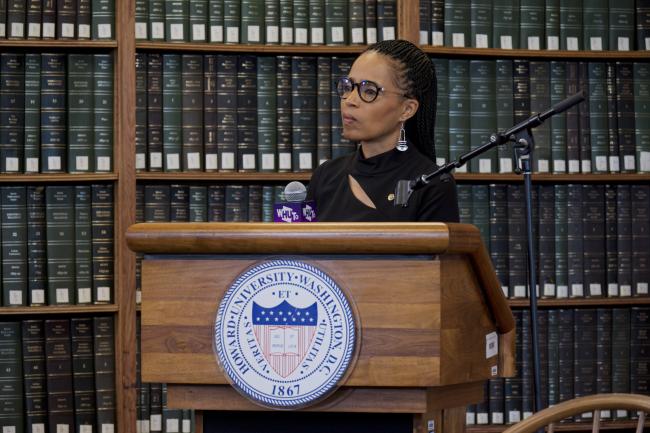Howard University launched its 2025-2026 Gwendolyn S. and Colbert I. King Endowed Chair in Public Policy series Friday, Sept. 19, immediately following Opening Convocation with a standing-room audience gathered in the recently reopened Founders Library.
Curated and hosted by Trustee Emeritus Marie C. Johns, the new series, “Marie Johns Presents The King Endowed Chair on Policy & Leadership: Elevating Voices, Shaping Policy, Building Communities,” opened with featured guest Sen. Angela Alsobrooks and a conversation titled “Setting the Frame for Elevating Our Voices.”
In her welcome, Johns tied the first King Chair event of the year to convocation oratrix Sherrilyn Ifill’s address, echoing that these are not unfamiliar times for our community.
“We are at another moment in history where you as the phenomenal student body at Howard University need to be prepared to lead the charge for what this country and the world needs to look like on the other side of where we are currently,” she said. “Harvest time has come to an end, and now it’s time to plant for a new future.”
Johns also set the course for the year ahead and underscored the series’ mission: to demystify public policy and connect it to the daily lives of Howard students and the broader community.
“Public policy is the element that affects all of our lives: It shapes how our children are educated, how we receive health care, and the quality of the water we drink,” Johns said. “Sen. Alsobrooks is uniquely qualified to talk about policymaking. She has held seats of power at nearly every level of government and often been the first Black woman in that seat.”
Campus voices set the tone
Before Alsobrooks arrived from a Senate vote, the audience heard instant reflections on convocation from various campus leaders. School of Law Dean Roger A. Fairfax Jr. situated the moment in the university’s constitutional tradition, noting the School of Law’s creation inside Founders Library mere months after the 14th Amendment’s ratification and the countless Bison who fought for civil rights over the years.
“The Howard University School of Law and the 14th Amendment have had a symbiotic evolution, and we are committed to making the 14th Amendment real, not a dead letter.” Fairfax said. “The School of Law will be there again as we fight for the new America that will emerge on the other side of this dark period.”
Political scientist and associate professor Keneshia N. Grant invited students to think historically about language, politics, and power. She traced debates over Reconstruction — what white scholars once labeled “redemption” and Black scholars have called the “nadir” — as an example of how perspective shapes public narratives.
“Language matters, and part of what you’re doing at Howard is filling your mind with ideas so you can develop your own,” Grant said. “Envision a future separate from whatever life we are living today.”
Student leaders likewise joined the discussion. Second-year student Ethan Bryant, the Howard University Student Association (HUSA) associate attorney general, greeted the audience and reflected on the power and vulnerability of the 14th Amendment in the current moment. He encouraged peers to engage public policy as both scholars and citizens, observing that rights can be “taken away piece by piece” without vigilance.
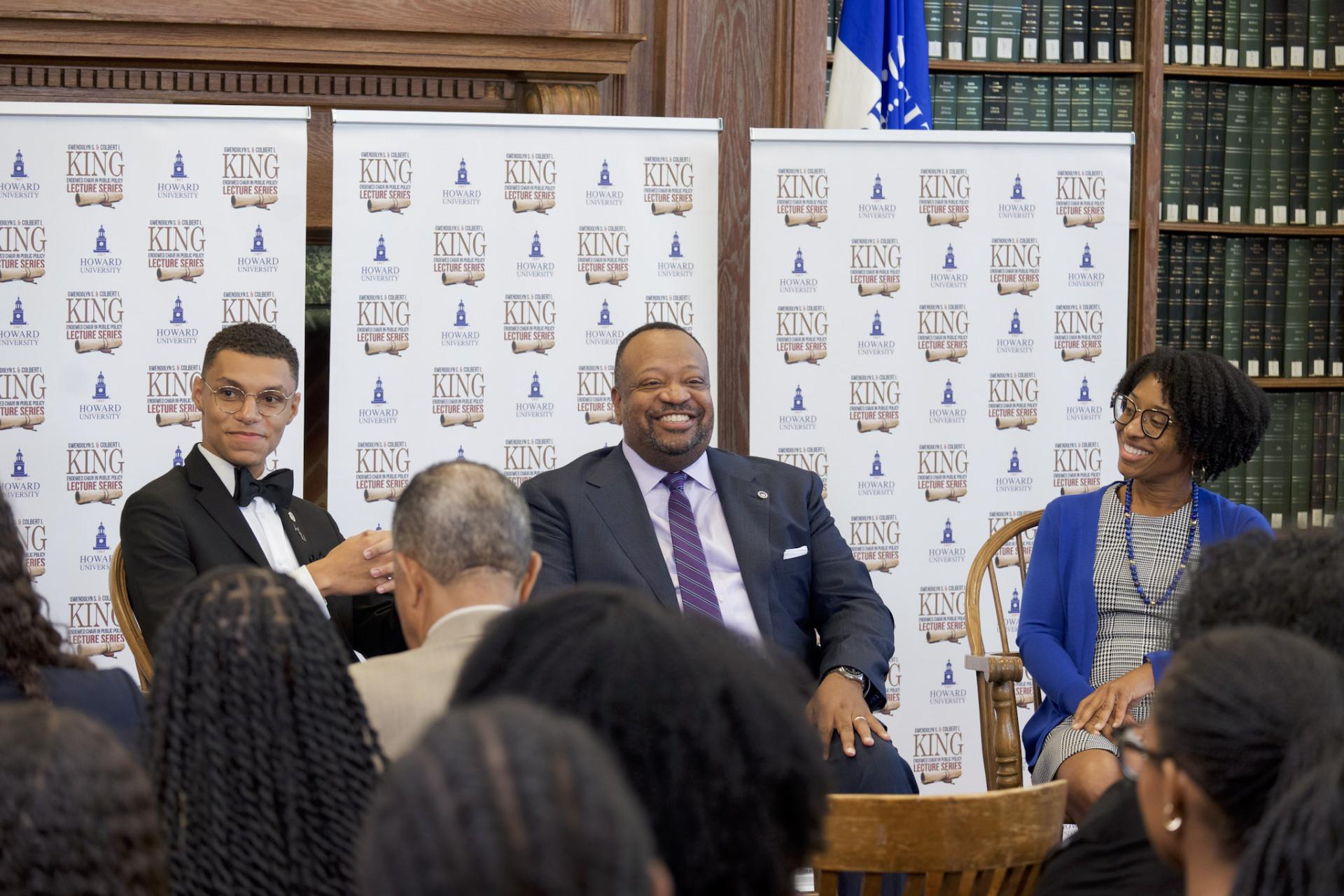
HUSA associate attorney general Ethan Bryant, School of Law dean Roger A. Fairfax Jr., and associate professor Keneshia N. Grant. (photo by Simone Boyd/Howard University)
‘Public policy is not abstract’
Alsobrooks anchored the program in her personal ties to Howard and the city: formative experiences at Banneker High School, in the Howard University Children’s Theater (where she learned skills she still uses as a public servant), and a semester as a student on exchange from Duke University.
“I was determined that I was going to be here [this afternoon],” she said. “Howard University is so very important to our country.”
Alsobrooks framed the afternoon with a clear thesis: “Public policy is not abstract.” She connected that principle to Howard’s history, from the members of Delta Sigma Theta Sorority, Incorporated, at the 1913 suffrage march to Thurgood Marshall’s social engineering through the courts, arguing advocacy and governance tangibly change lives.
She also shared the moment that moved her from courtroom to policymaking. As a young prosecutor and mother, a friend confronted her about community safety.
“When your daughter asks what you did about what you saw, what will you tell her?” she recalled being queried. She felt convicted to seek public office to build solutions, such as the first mental health and addictions care facility in her county, increased investments in schools, and more equitable housing policies.
Alsobrooks spoke candidly about representation and ambition. After a Senate staffer told her she was the first Black woman to stand on the Senate floor with braided hair, she reflected on the broader mandate.
“We change the rooms where we go,” she said. “We change the norms.”
She urged students to claim space in policy arenas that build generational wealth and opportunity.
“Don’t just have me working on the policies you expect,” she said. “I want to work on cryptocurrency, artificial intelligence, and quantum computing. … I want to be on the Banking Committee to determine how we build houses and allow us to own homes.”
I was determined that I was going to be here [this afternoon]. Howard University is so very important to our country.”
A dialogue on purpose and preparation
The conversation’s interactive spirit continued during the question-and-answer portion. Fairfax asked Alsobrooks what guidance she would offer students navigating their personal purpose and societal need.
“Follow your heart and become brilliant in the thing you love,” Alsobrooks said. “Pursue the thing that makes you jump out of bed in the morning and then find a way to make it benefit other people.”
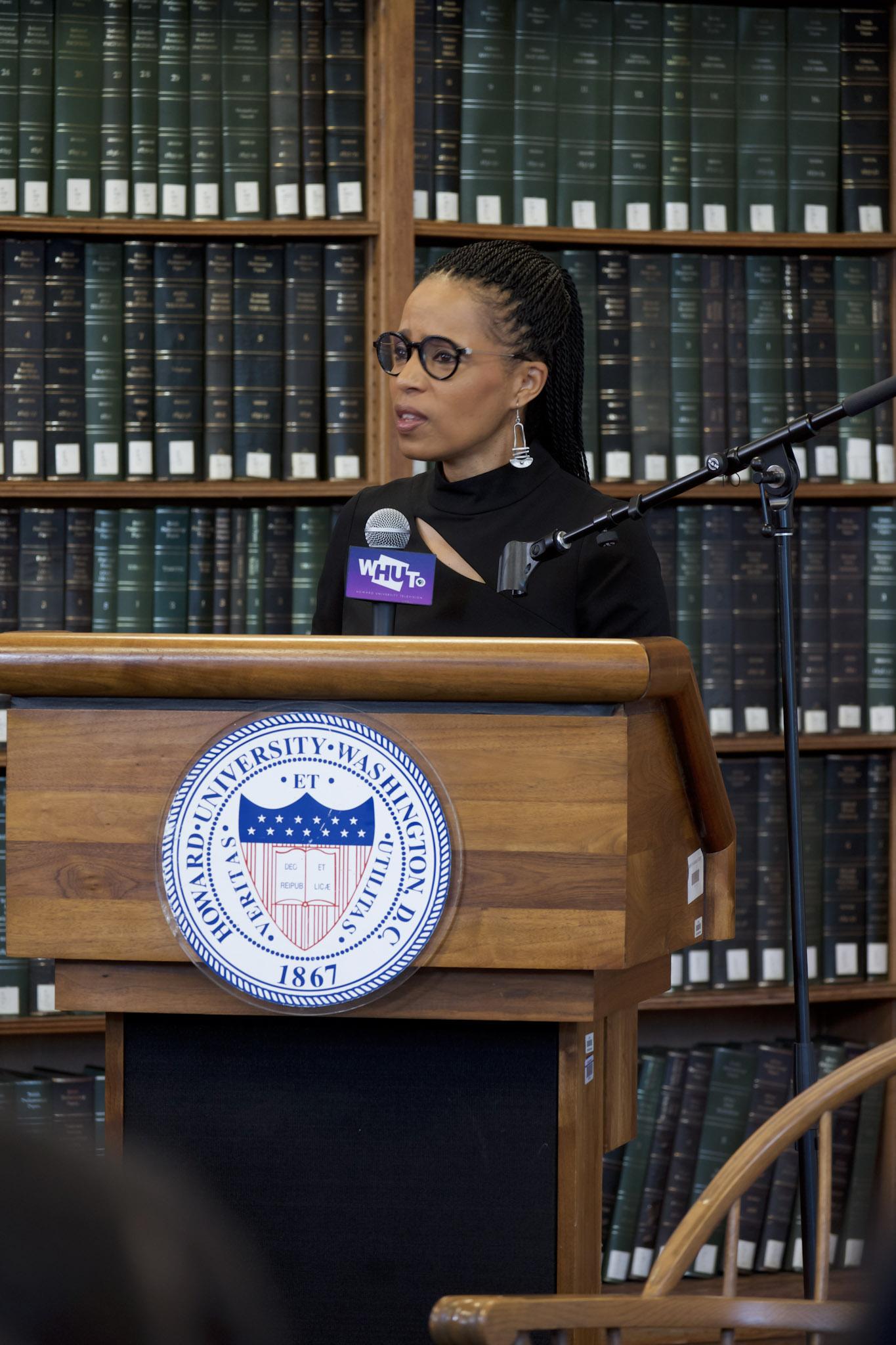
Grant then asked how to thrive beyond familiar spaces. Alsobrooks urged students to step into rooms where they are needed, even if those rooms are uncomfortable — advice from her daughter that helped shape her presence in the Senate.
“Go take up some space in every place that you go. Know that you deserve to be there and we need you in the spaces, not just the ones that make you feel comfortable when you walk through the door,” she said. “You might know you’re in the right place when you feel a little discomfort, because that’s where you can make great difference.”
When Bryant, a Detroit native, raised the challenge of leading in a city that has not always enjoyed Black congressional representation, Alsobrooks urged persistence and vision.
“I say not to be constrained by what you see today,” she said. “Set the course for yourself. Decide what the next step is — whether that’s to go work in Congress, take on a local position, run for something — do not be afraid. Because you can’t see it today does not mean that it won’t happen. I think it absolutely will happen.”
Interim President and President Emeritus Wayne A. I. Frederick, M.D., MBA, stopped by to offer his gratitude to Alsobrooks and Johns for their participation in the King Chair Series and broader service to the university, deeming the day an immediate entry into the Howard archive.
“There’s only one other trustee who was not a Howard alum who has probably contributed as much to this university as Trustee Johns, and that person is Frederick Douglass,” Frederick said. “These are the types of days that you come back 50 years from now, and somebody’s going to say, ‘What happened at Howard University on September 19, 2025?’ and you’re going to be part of that [report].”
Johns closed by thanking campus partners and previewing what’s next in the series: an Oct. 22 session examining Google and policies shaping the creative community and creative industries. She invited students and community members to keep showing up; their questions, she said, are what make the series meaningful.
Related Story
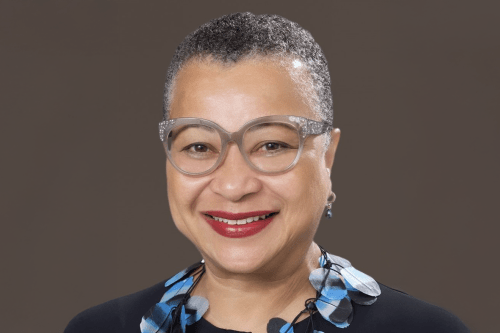
Marie Johns Appointed Chair of the Gwendolyn S. and Colbert I. King Endowed Chair in Public Policy at Howard University
Keep Reading
-
 Student Athletes
Student AthletesHoward University to Face North Carolina A&T at Duke’s Cameron Indoor Stadium, Returning to the Site of MEAC History
Dec 3, 2025 4 minutes -
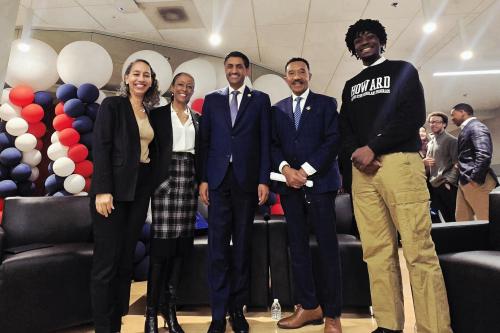 Advocacy
AdvocacyHoward University Hosts Critical Conversation with Congressional Leaders on AI Workforce and Tech Innovation
Dec 2, 2025 4 minutes -
 Accolades
AccoladesHoward University Architecture Assistant Professor Nea Maloo Receives AIA|DC 2025 Architect Educator Award
Dec 2, 2025 2 minutes
Find More Stories Like This
Are You a Member of the Media?
Our public relations team can connect you with faculty experts and answer questions about Howard University news and events.
Submit a Media Inquiry

